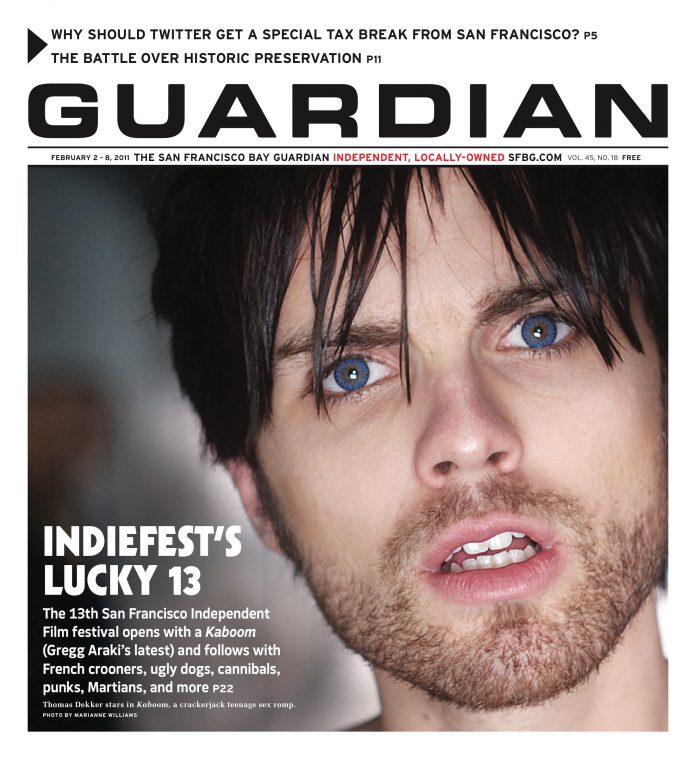FILM/INDIEFEST “Oh, it’s a problem with women,” Serge Gainsbourg says in an interview clip only a few seconds into Pascal Forneri’s entertaining and energetic made-for-TV documentary Gainsbourg, The Man Who Loved Women. For Gainsbourg, the problem was a rewarding one — women were the vehicle by which he moved from a brooding writer of chanson into a national and international provocateur and icon. On an artistic front, Gainsbourg arranged and delivered one musical bouquet after another for a multitude of female singers, to a degree that Forneri’s movie has to adopt a breakneck pace just to include some of his best songs. As time goes on, his accomplishment seems equal to, if not greater than, that of the Beatles, Stones, Beach Boys, and other English-language rock icons.
Opening with over-the-top Gallic narration and arranged into a series of commercial-ready chapters, Gainsbourg, The Man Who Loved Women isn’t pretentious, and it takes care to deliver some of Gainsbourg’s most infamous televised moments, such as a talk show where he — by that time fully and fatalistically given over to his messy, dissolute Gainsbarre mode — informed a young and imperial Whitney Houston he’d like to fuck her. We also get to enjoy young France Gall naively telling an amused and appreciative Gainsbourg that his latest hit song for her, “Les sucettes,” is about “a young girl named Annie who loves lollipops.”
But Forneri’s movie also reveals the sensitivity beneath Gainsbourg the provocative “women’s tailor” of French songwriting. After all, it was Gainsbourg who had Gall sing of herself as “a lonely singing doll.” In one interview excerpt, Gainsbourg says that he prefers writing songs for actresses because they are “more spontaneous than your typical moron,” then criticizes a market that celebrates and throws away young starlets as inherently “fucked.” “It’s very hard to find work, and they don’t do it for the money,” he says bluntly.
Aside from the bombastic narration, Gainsbourg, The Man Who Loved Women‘s primary commentary comes from the women who worked with and knew Gainsbourg, an illustrious group that includes Brigitte Bardot, Jane Birkin, Juliette Greco, Francoise Hardy, and Vanessa Paradis. One of Forneri’s chief stylistic gambits is to leave these interviews off-screen — aside from appearances within archival footage, Gainsbourg’s women are present only as voices. In one sense this sharpens a critical view of Gainsbourg the man, but it also masks the individuality of the women’s perspectives, turning them all into a single femme.
Nonetheless, there are numerous moments where the likes of Birkin assert their personality. Hardy states that writing for women allowed Gainsbourg to express his “sensitivity” and “sentimentality,” an idea that might not be as true when applied to the partnership of Christopher Wallace and Lil’ Kim half a decade after Gainsbourg’s death. Hip-hop’s Bonnie and Clyde duos only follow in the footsteps of Gainsbourg and Bardot, even if Bardot would rather think of herself as George Sand to his Chopin.
Gainsbourg, The Man Who Loved Women is a story that tells itself. There’s an epic’s worth of turbulent romanticism in the still photos of a blissful and radiant Gainsbourg and Bardot recording the original, suppressed version of “Je t’aime … moi non plus,” and the television footage of a cynical Gainsbourg and a brash, irrepressibly coltish Birkin discussing their version of the song. The man himself says that he came up with both “Je t’aime” and “Bonnie and Clyde” in a single night after Bardot said (commanded?), “Write me the most beautiful song you can imagine.” Thanks to “Je t’aime,” Gainsbourg’s name is irrevocably associated with sex. But as anecdotes from Greco and Birkin make clear, he’d just as soon stay up all night talking and drinking with a woman. Instead of orgiastic pleasures, Gainsbourg and Birkin’s first night in a hotel concluded with her gifting a 45 of Ohio Express’ “Yummy Yummy Yummy” (as in “I got love in my tummy”) to Gainsbourg as he slept.
In focusing on Gainsbourg’s relationships with female singers, Gainsbourg, The Man Who Loved Women ignores his musical partnerships with men, most notably Jean-Claude Vannier, with whom he composed and arranged many of his greatest works. But Forneri’s movie arrives at a time when another wave of interest in Gainsbourg is growing in the U.S. and other countries outside France. The past few years have seen Light in the Attic reissue some of Gainsbourg’s greatest recordings, such as 1971’s Histoire de Melody Nelson, the 1969 album version of Je t’aime (which contains Birkin’s “Jane B,” the model for vocals by Blonde Redhead, Deerhoof, and countless others), and Birkin’s 1973 solo debut, Di Doo Dah. This month, a new compilation of Gainsbourg’s pre-starlet compositions, Discograph’s Le claquer de mots, shines light on the big-eared outsider right before he hit the pop jackpot. If the 1990s saw a surface-level revival of Gainsbourg the cult icon, today, his eternal return runs deeper.
GAINSBOURG, THE MAN WHO LOVED WOMEN
Sat/5, 2:30 p.m., Roxie;
Sun/6, 9:15 p.m., Roxie

